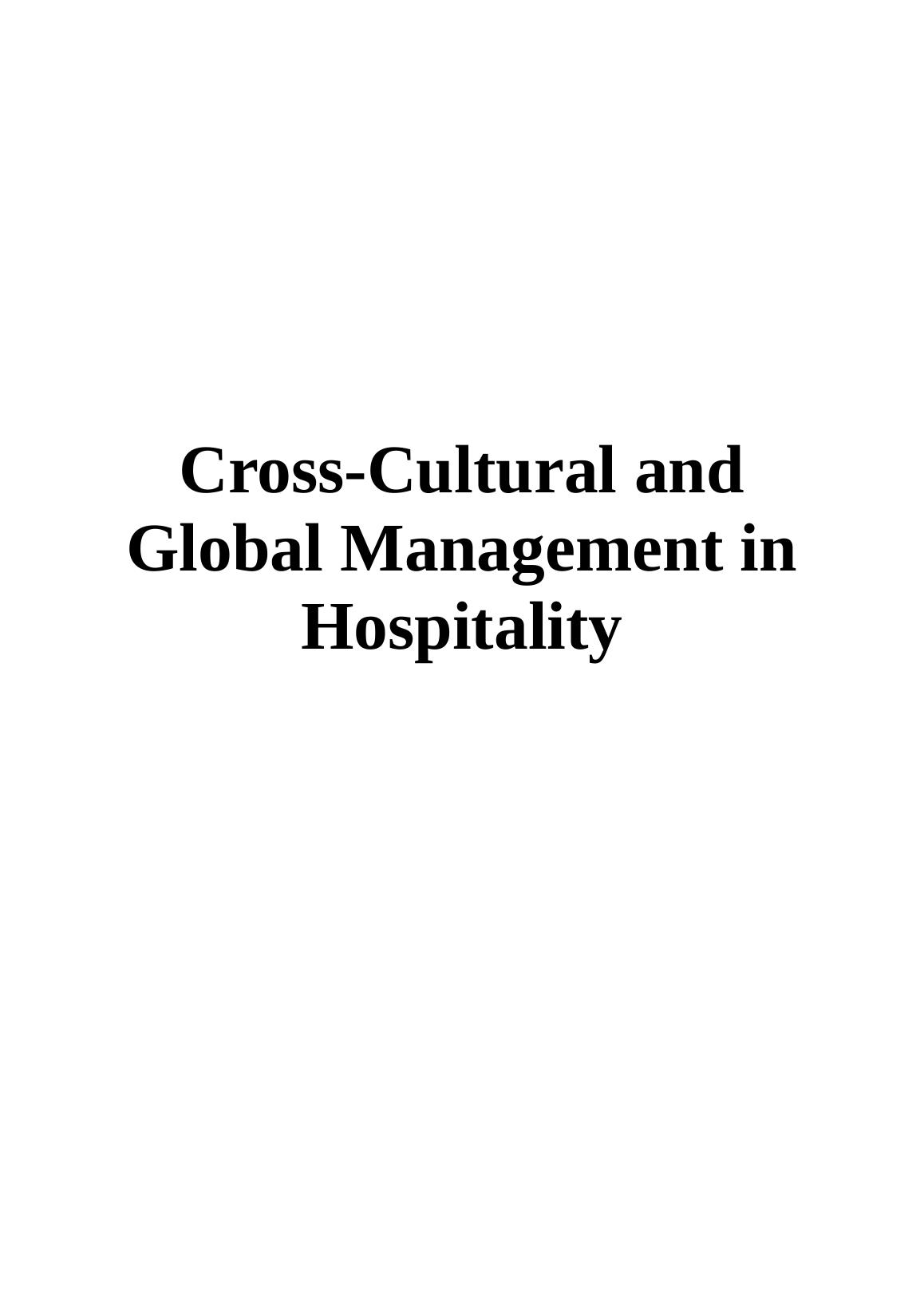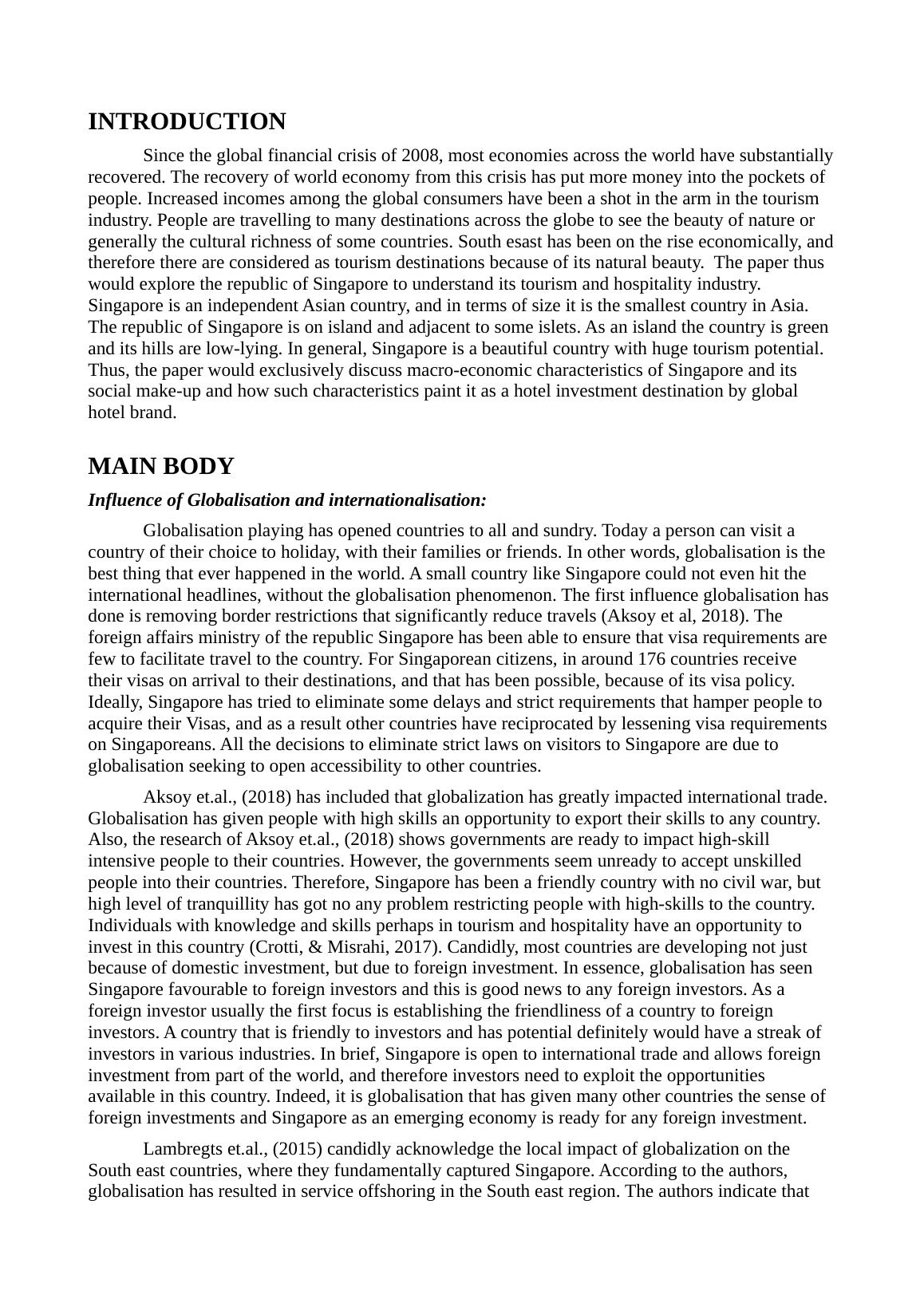Cross Cultural & Global Management in Hospitality
Added on 2020-07-22
9 Pages3600 Words40 Views
Cross-Cultural andGlobal Management inHospitality

TABLE OF CONTENTSINTRODUCTION................................................................................................................................3MAIN BODY.......................................................................................................................................3CONCLUSION....................................................................................................................................8REFERENCES.....................................................................................................................................9

INTRODUCTIONSince the global financial crisis of 2008, most economies across the world have substantiallyrecovered. The recovery of world economy from this crisis has put more money into the pockets of people. Increased incomes among the global consumers have been a shot in the arm in the tourism industry. People are travelling to many destinations across the globe to see the beauty of nature or generally the cultural richness of some countries. South esast has been on the rise economically, andtherefore there are considered as tourism destinations because of its natural beauty. The paper thus would explore the republic of Singapore to understand its tourism and hospitality industry. Singapore is an independent Asian country, and in terms of size it is the smallest country in Asia. The republic of Singapore is on island and adjacent to some islets. As an island the country is green and its hills are low-lying. In general, Singapore is a beautiful country with huge tourism potential. Thus, the paper would exclusively discuss macro-economic characteristics of Singapore and its social make-up and how such characteristics paint it as a hotel investment destination by global hotel brand. MAIN BODYInfluence of Globalisation and internationalisation:Globalisation playing has opened countries to all and sundry. Today a person can visit a country of their choice to holiday, with their families or friends. In other words, globalisation is the best thing that ever happened in the world. A small country like Singapore could not even hit the international headlines, without the globalisation phenomenon. The first influence globalisation has done is removing border restrictions that significantly reduce travels (Aksoy et al, 2018). The foreign affairs ministry of the republic Singapore has been able to ensure that visa requirements are few to facilitate travel to the country. For Singaporean citizens, in around 176 countries receive their visas on arrival to their destinations, and that has been possible, because of its visa policy. Ideally, Singapore has tried to eliminate some delays and strict requirements that hamper people to acquire their Visas, and as a result other countries have reciprocated by lessening visa requirements on Singaporeans. All the decisions to eliminate strict laws on visitors to Singapore are due to globalisation seeking to open accessibility to other countries. Aksoy et.al., (2018) has included that globalization has greatly impacted international trade. Globalisation has given people with high skills an opportunity to export their skills to any country. Also, the research of Aksoy et.al., (2018) shows governments are ready to impact high-skill intensive people to their countries. However, the governments seem unready to accept unskilled people into their countries. Therefore, Singapore has been a friendly country with no civil war, but high level of tranquillity has got no any problem restricting people with high-skills to the country. Individuals with knowledge and skills perhaps in tourism and hospitality have an opportunity to invest in this country (Crotti, & Misrahi, 2017). Candidly, most countries are developing not just because of domestic investment, but due to foreign investment. In essence, globalisation has seen Singapore favourable to foreign investors and this is good news to any foreign investors. As a foreign investor usually the first focus is establishing the friendliness of a country to foreign investors. A country that is friendly to investors and has potential definitely would have a streak of investors in various industries. In brief, Singapore is open to international trade and allows foreign investment from part of the world, and therefore investors need to exploit the opportunities available in this country. Indeed, it is globalisation that has given many other countries the sense of foreign investments and Singapore as an emerging economy is ready for any foreign investment.Lambregts et.al., (2015) candidly acknowledge the local impact of globalization on the South east countries, where they fundamentally captured Singapore. According to the authors, globalisation has resulted in service offshoring in the South east region. The authors indicate that

End of preview
Want to access all the pages? Upload your documents or become a member.
Related Documents
Safety and Security in Tourism Assignmentlg...
|5
|927
|469
Saudi Arabia’s Tourist Visa and its Impact on Hotel Marketlg...
|12
|4278
|55
Hotel Industry of Singaporelg...
|13
|3222
|215
Public Health Concerns of Tourist Visas for Medical Treatment in Indialg...
|5
|1285
|457
Authentic Leadership in the Face of the COVID-19 Crisislg...
|11
|3787
|49
Tourism Concepts and Issues - Assessment 2lg...
|15
|5592
|356
